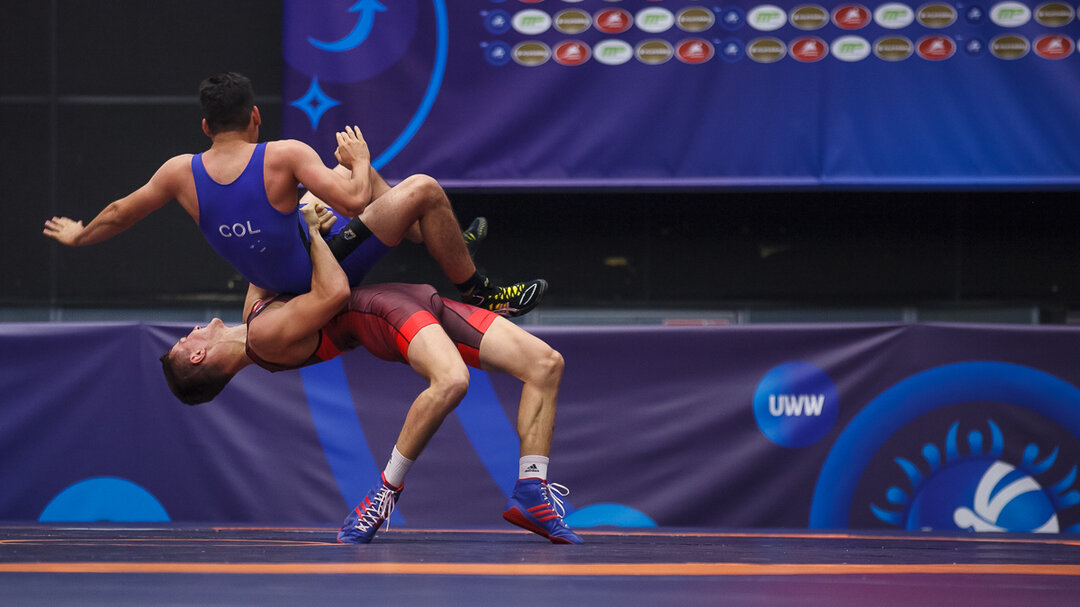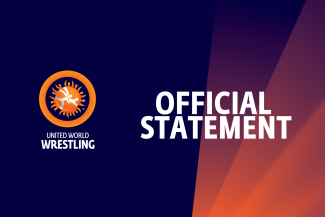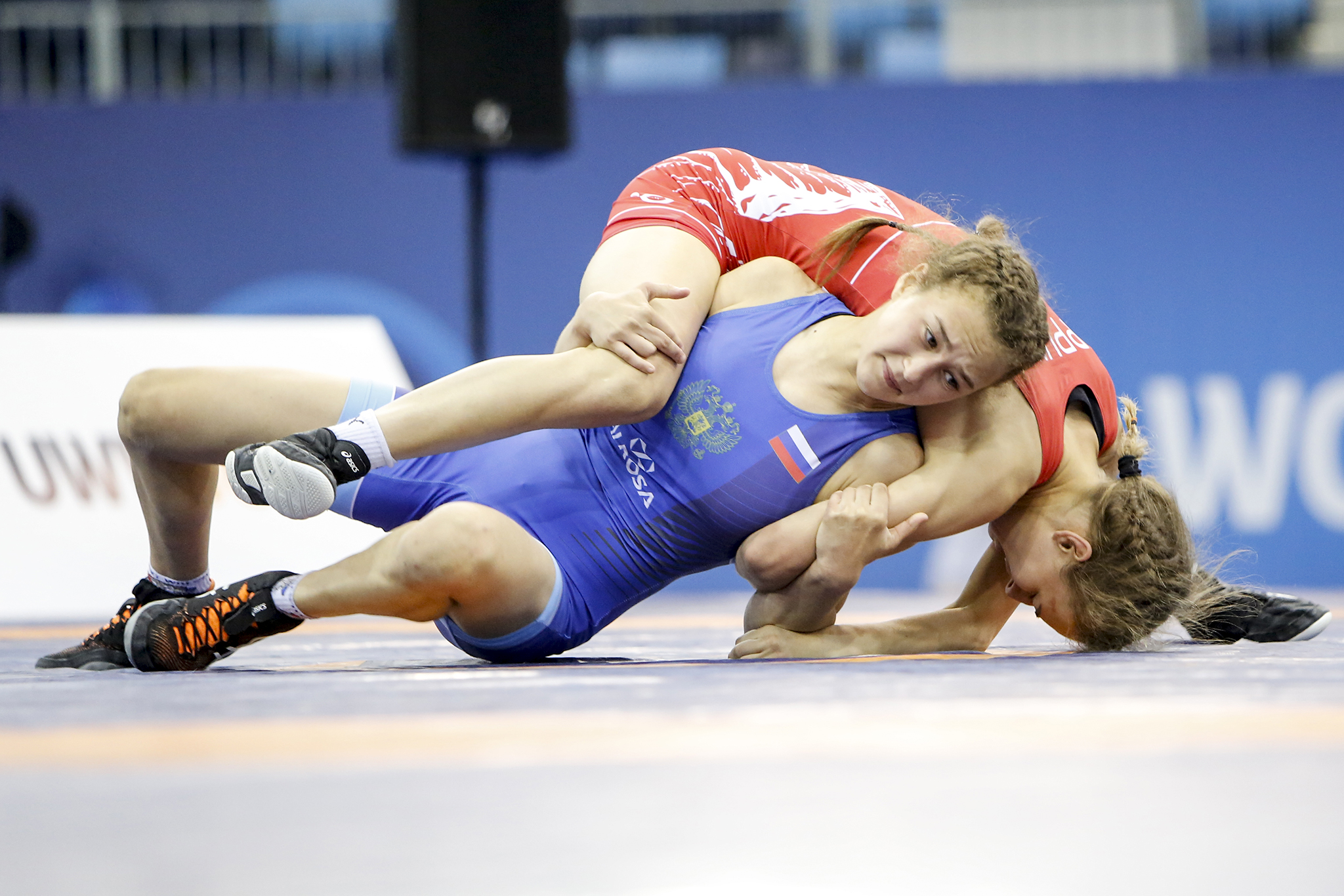Opiev Stuns World Champ Bey, Betschart and Mohamed Make History
Monday, September 17, 2018 - 18:51 By Eric Olanowski
TRNAVA, Slovakia (September 17) – For most people, Monday is the worst day of the week, but not Russia’s Islam OPIEV (RUS). Opiev knocked off back-to-back Junior World finalist Kamal BEY (USA) to start his week and make his first-ever Junior World gold-medal bout.
Opiev silenced the Mestská Sports Hall, dominating the bottom side of the 77kg bracket which included three of the four returning 74kg world medalists from Tampere 2017. His run to the finals included four wins, including the gold and silver medalists from last year’s junior world championships, Bey and Akzhol MAKHMUDOV (KGZ).
After locking up wins in his first two bouts, Opiev me returning Junior world runner-up and 2018 Asian champion, Makhmudov in the quarterfinals. He trailed 1-0 before earning a passivity point and holding on to win a slow 1-1 bout.
The quarterfinal win stopped a potential finals rematch and put Opiev on a semifinal path to Bey.
In that semifinal bout, Opiev squared off with Bey whose high-flying, aggressive style has made him one of the most-watched wrestlers in the world.
The Russian wrestler was shutout in the opening period and trailed 1-0 heading into the final three minutes. In the second period, last year's 26th place finisher, Opiev outscored Bey 7-0 and won the bout 7-1, making his first-ever world finals.
Opiev will wrestle reigning Junior world bronze medalist Sajan SAJAN (IND) for the 77kg gold medal.
Sajan defeated Ukraine's Dmytro GARDUBEI (UKR) 4-1 in the semifinals to improve on his third-place finish from a year ago. Sajan is the lone Indian wrestler to make the finals after India put four wrestlers into the day one semifinals.
 df. Juan Sebastian DAVID RIVERA (COL) by TF, 10-0.jpg) Ramon BETSCHART (SUI) will wrestler Tuesday night for Switzerland's first-ever Junior World medal. (Photo by Justin Hoch)
Ramon BETSCHART (SUI) will wrestler Tuesday night for Switzerland's first-ever Junior World medal. (Photo by Justin Hoch)
Meanwhile, Ramon BETSCHART (SUI) not only became Switzerland's first-ever junior world finalist, but he became Switzerland's first-ever junior world medalist. Before Betschart's semifinal win, Switzerland's highest Greco-Roman finish came from Thomas ROETHISBERGER (SUI) at the 1992 World Championships when he finished in fourth place.
Betschart historic run to the finals included a technical superiority win over Ardo PAJUR (EST), a 5-5 criteria win over Maimaiti KAISAIER (CHN), and a 5-3 semifinals victory over Nazarshah FATULLAYEV (AZE).
The Swiss wrestler will take on the 2018 Asian Junior champion Mohammadhadi SARAVI (IRI) in tomorrow night's 87kg gold-medal bout.
Joining Betschart in the history hunt will be Egypt's Hassan MOHAMED (EGY), who will also be wrestling for his countries first-ever Junior World gold medal. Egypt has had three wrestlers who previously made it as far as Mohamed, but each has fallen in the Junior world gold-medal bout.
Tomorrow night, Mohamed, the 2017 Junior world bronze medalist will try to change history when he competes against Kyrgyzstan's 2016 Cadet world bronze medalist Erbol BAKIROV in the 63kg finals match.
The day two Greco-Roman finals begin at 18:00 (local time).
*Please note that the start time for Tuesday, September 18 has been updated. The new start time is 9:30 AM and not 10:30 AM as originally released.
RESULTS
55kg
GOLD - Pouya NASERPOUR (IRI) vs. Tigran MINASYAN (ARM)
Semifinals - Pouya NASERPOUR (IRI) df. Nurtazin KERIMBERDI UULU (KGZ), 7-1
Semifinals - Tigran MINASYAN (ARM) df. Vijay VIJAY (IND), 8-0.
63kg
GOLD - Erbol BAKIROV (KGZ) vs. Hassan MOHAMED (EGY)
Semifinals - Erbol BAKIROV (KGZ) df. Azamat KAIROV (RUS), via fall
Semifinals - Hassan Hassan MOHAMED (EGY) df. Sagar SAGAR (IND), 5-3
77kg
GOLD - Islam OPIEV (RUS) vs. Sajan SAJAN (IND)
Semifinals - Islam OPIEV (RUS) df. Kamal BEY (USA), 7-1
Semifinals - Sajan SAJAN (IND) df. Dmytro GARDUBEI (UKR), 4-1
87kg
GOLD - Mohammadhadi SARAVI (IRI) vs. Ramon Rainer BETSCHART (SUI)
Semifinals - Mohammadhadi SARAVI (IRI) df. Ilia ERMOLENKO (RUS), 3-1
Semifinals - Ramon BETSCHART (SUI) df. Nazarshah FATULLAYEV (AZE), 5-3
130kg
GOLD - David OVASAPYAN (ARM) vs. Amin MIRZAZADEH (IRI)
Semifinals - David OVASAPYAN (ARM) df. Cohlton Michael SCHULTZ (USA), 2-1
Semifinals - Amin MIRZAZADEH (IRI) df. Beka MAKARIDZE (GEO), 9-0



Share your thoughts.
Comments